The road into Rongcheng county is wide, dusty and flanked by flat farmland. It takes us past scenes typical of this quiet part of Hebei: horse stables, a roadside wet market, wheat farmers preparing for the summer harvest. High-speed rail hasn’t reached these parts, so we’re making the journey from Beijing via Baoding, a city about 50 kilometers to our west.
Yet, if recently announced plans come to fruition, this area will be transformed beyond recognition. Rongcheng has been named – along with neighboring counties Anxin and Xiongxian – as the location of a new Special Economic Zone, an area of targeted trade, development and investment akin to Shenzhen or Shanghai’s Pudong district.
Known collectively as the Xiongan New Area, these three rural counties will act as a deputy capital. Designed to relieve the pressures facing Beijing (congestion, overcrowding and other “urban ills,” as they’re officially known), the area’s population is set to increase more than fivefold in the next 15 years. Morgan Stanley forecasts up to RMB2.4 trillion in investment will flood in over the next decade – quite the transformation in a place where, for now at least, there isn’t even reliable phone reception.
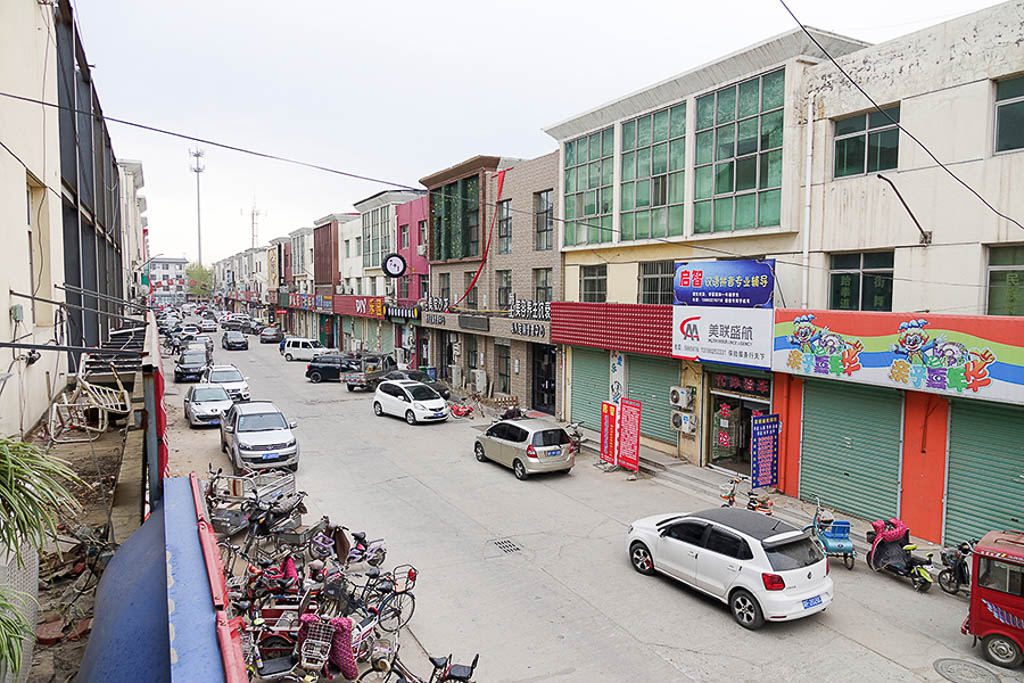
Signal improves as we enter Rongcheng’s main town, a cluster of simple one- and two-story brick buildings. The county is known for its textile manufacturers, and this main artery is lined with clothing stores and wholesalers. Locals appear eager to discuss the news.

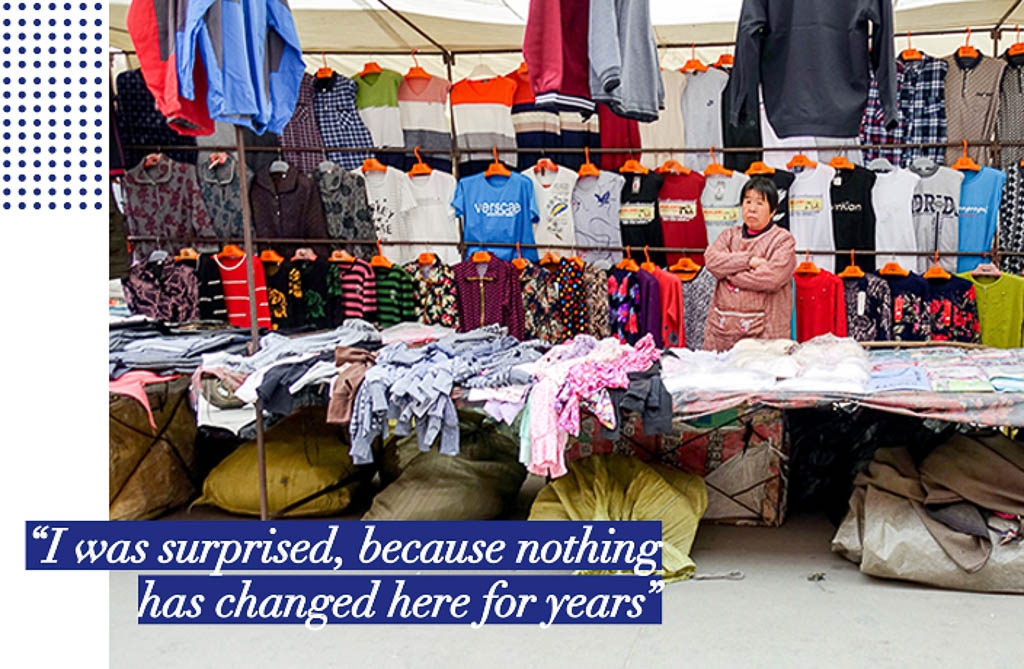
“I was surprised,” says a vendor surnamed Deng, of the moment she heard the news. “Nothing has changed here for years.”
Like many involved in Rongcheng’s clothing industry, Deng is selling her wares (a series of shirts branded “Calvin Klain”) on the town’s main shopping street. She’s unsure about how the New Area will change her life, but her neighboring vendors are quick to show their enthusiasm.

Butcher Zhang Keming says, “I’m pretty sure my livelihood is going to get better.” And Li Hua, the manager of a local vegetable market, says, “It is really good for all of us. It’s better for old people’s retirement, and it will mean better schools for children.”
Rongcheng residents seem unified in their support for the district. But a woman from Shenzhen who works in the town – and asks not to be named – is furious about the plan. When she sees us conducting interviews with unanimously optimistic Rongcheng locals, she rushes over to interrupt us.
“If they tear down the old buildings, there won’t be any places where I can afford to live,” she tells us. “It’s a good thing for locals, but not for me.”
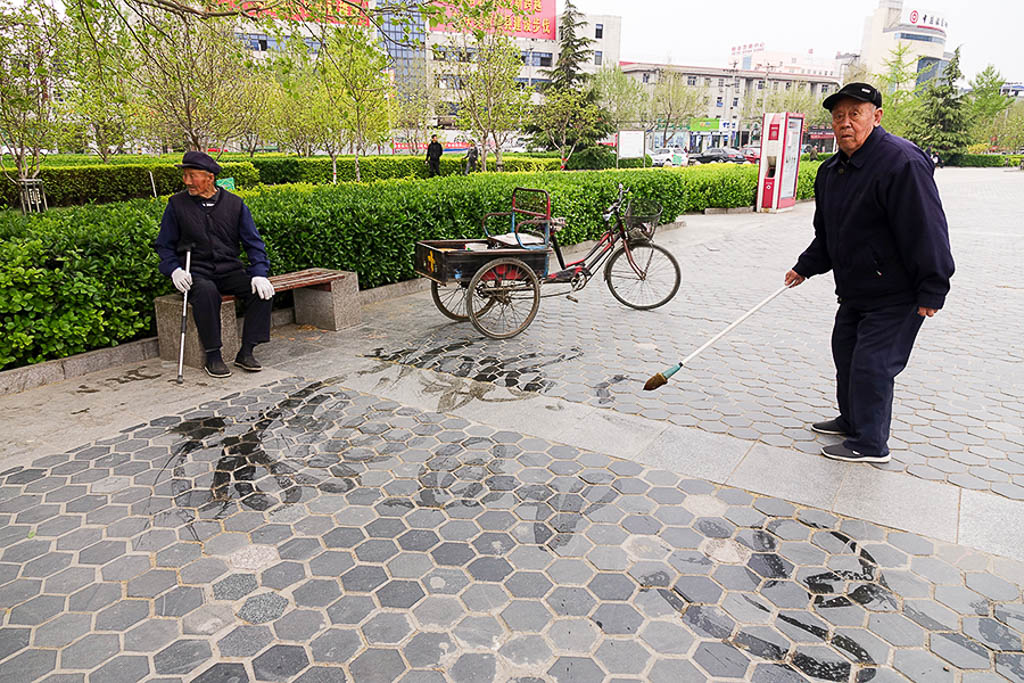

Indeed, it’s locals who stand to benefit most. They’re the ones who have a Rongcheng hukou - which means access to local schools and benefits – and those who own land here have already seen their property leap in value since the announcement of the New Area.
Liang Guozhi is a local business owner who’s excited for the changes to come. He and his elderly friends talk excitedly about the plan and how it will improve local commerce. “Business here has been so-so,” he admits, before launching into a speech lauding Xi Jinping, who he says is bound to improve things.
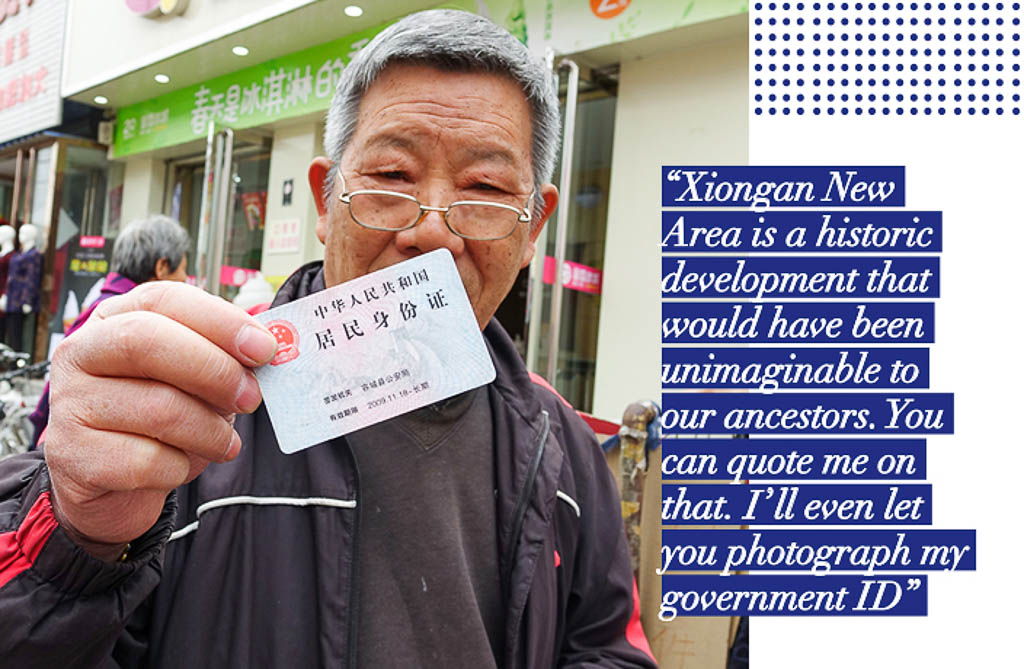
We stand there, listening to him on the street corner, for some time. “Let me tell you something,” he proclaims. “Xiongan New Area is a historic development that would have been unimaginable to our ancestors.” To prove just how sure he is, when we ask his name, he says “You can quote me on that. I’ll even let you photograph my government ID.” When we ask if he has noticed a lot of foreigners visiting Rongcheng, post-announcement, he says: “You are the first. I’ve never seen foreigners here before, ever.”
Perhaps so, but there have been plenty of outsiders here in recent weeks. On the day Xiongan was announced, real estate speculators flooded in from Beijing and beyond. House prices reportedly jumped overnight from RMB10,000 per square meter to RM17,000 per square meter. In response, local authorities ordered an immediate freeze on property sales.
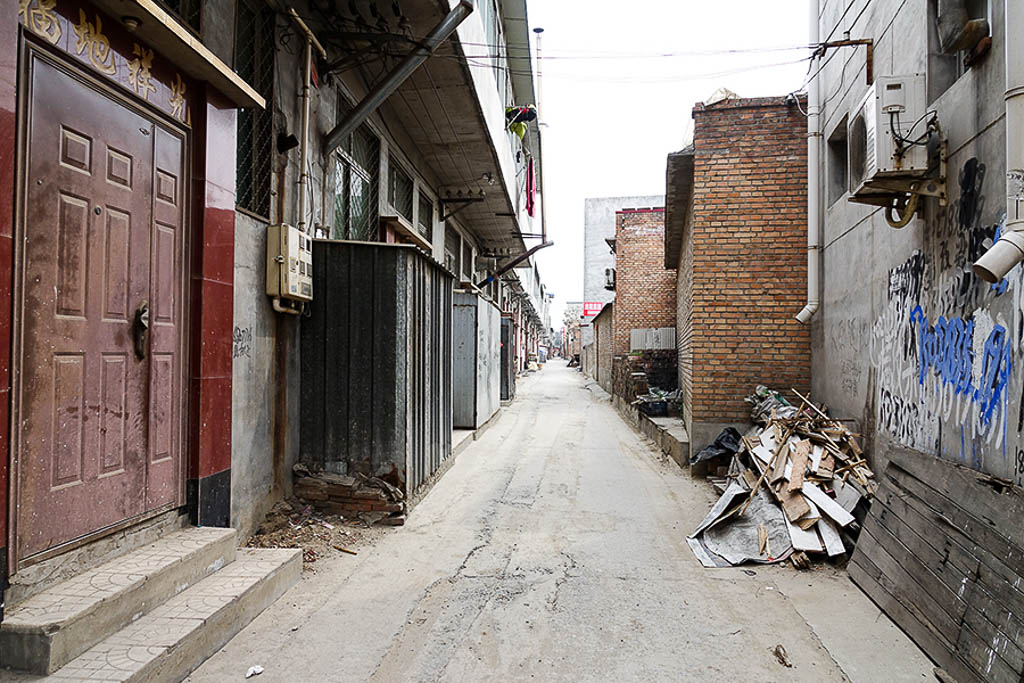

Burgeoning demand will surely be good news for local homeowners, like the proprietor of a Rongcheng dumpling restaurant who also asks not to be named in our story. Although the restaurateur is likely to benefit when restrictions are lifted, he is worried about the impact on his livelihood.
“Personally, I’m concerned that small businesses like mine will be shut down and forced to relocate,” he says. “And I’m just a normal guy – I can't get another more ‘professional’ job.
“But on the other hand, the population is likely to increase, which will hopefully bring more customers into my shop,” he adds. “And the environment should improve too.”
The man attests to the influx of speculators, directing us toward a local hotel that’s being used a temporary hub for officials. There’s business to be done here. Sure enough, we find the hotel’s entrance cordoned off and guarded by local police. Entry is only being granted to those with pre-booked meetings. But plenty have turned up to try their luck.
Among them is property developer Ke Jingbin, who has driven the 160km from Beijing to scope out business opportunities. He doesn’t have a meeting booked, but he’s confident about the area’s prospects.
“You can’t buy land for housing,” he confirms. “But there are business permits available for electricity, the environment and infrastructure. I’m hoping to get inside.”
It’s a waiting game for those hoping to profit from Xiongan. When we contact Ke the next day, he tells us that he eventually gained access to the building, though he “didn’t get any good information.” He says that although there were government officials inside, he was unable to see “the main ones.”

We depart Rongcheng and pass along country roads to the neighboring county of Xiongxian. Maize, wheat and millet are abundant here. Hebei may be known for steel production and heavy industry, but 40 percent of the province’s population is employed in the forestry and agricultural sectors. And somewhat surprisingly, given that we’re right next to Baoding (a city named China’s most polluted in 2015), this part of Hebei is remarkably green.
In fact, this is one of the reasons why this site was chosen (another being that it is close to both Beijing and Tianjin, two hubs of the Jing-Jin-Ji megalopolis). By centering the Special Economic Zone around the wetlands of Baiyangdian Lake, urban planners envisage Xiongan as “a city with scenic ecological environment, blue skies, fresh air and clean water,” according to Chinese state media.
Baiyangdian Lake is a tourist attraction in itself, but now its visitors want to see the site of the New Area. Upon our arrival in Xiongxian, we find a group of more than 30 tourists taking photos in front of the local government headquarters, an austere and otherwise unremarkable slab of gray concrete. Their tour guide tells us that, since the announcement, people have been requesting pilgrimages to the town.
“They like to say they’ve been to the New Area. It makes them proud,” she says, as a large family poses for a photo with a cry of “Xinqu jiayou!” (‘Come on, New Area!’).
There’s evidently a great deal of optimism and anticipation here. But there’s a fair amount of confusion too. All of the locals we speak to were surprised by the announcement. And no one seems able to offer any tangible idea of what the future holds.
That includes those who make a living from speculation. At the nearby real estate firm Beijing Zhenyuan Construction Ltd. Co., we find general manager Shen Junhua and her associates enjoying an afternoon of baijiu and cigarettes in the office. With the ban on property sales, there’s little else to do.
Our slew of questions – What do you think the area will look like in 20 years? What does this mean for local businesses? What do you think will happen to house prices? – are met with declarations of ignorance. Shen wasn’t told anything, she says, and no one knows what’s going to happen.

“We’re not sure when we can start transactions again, we’re waiting for word from the local government,” Shen says, before rebutting our suggestion that the freeze may affect business. “It’s not a bad thing, it’s a temporary thing. This is definitely good for the area. Supposedly it’s going to be good for everyone.”
For now, Xiongan is a vision built on hope. But it is also one built on political will. A circular issued by the Chinese Government grandiosely describes the project as “a strategy crucial for a millennium to come.”
Whether it will flourish like Shenzhen or Pudong remains to be seen. What is certain is that the lives of people in these three rural counties have been turned on their heads – and most of them are pretty happy about it.
Stay tuned for Parts II & III of our Hebei Series






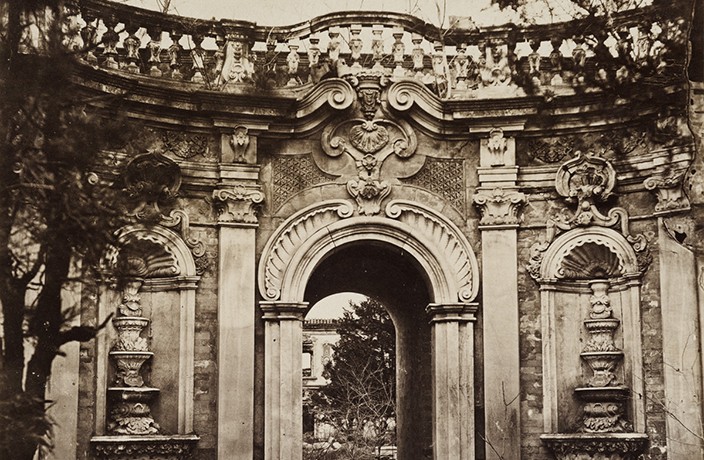














0 User Comments